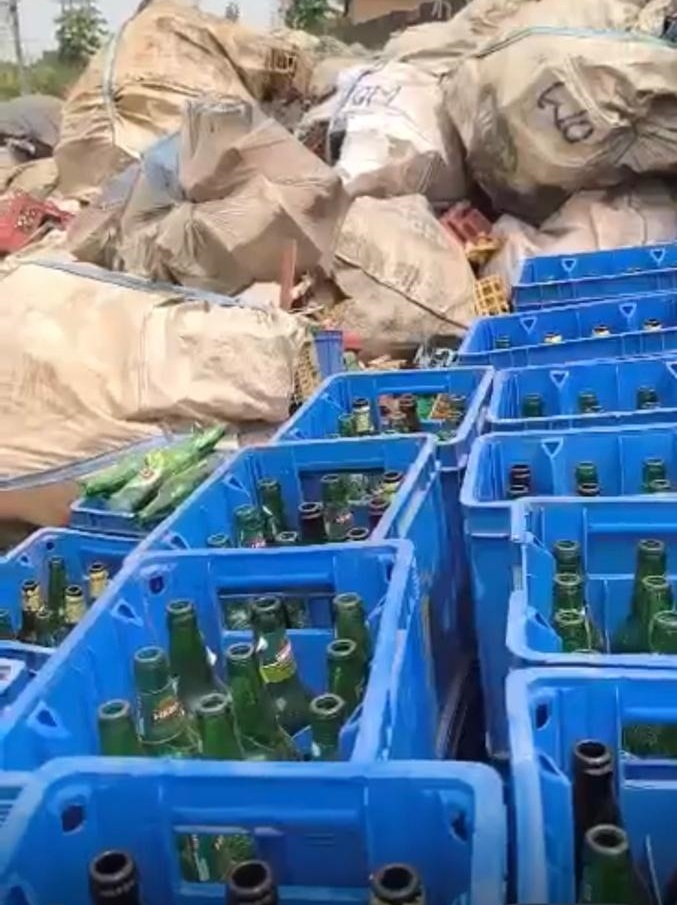Brands/Products
Customs Loses 70 Officers To Smugglers

No fewer than 70 personnel of the Nigeria Customs Service were lost within seven months while on duty.
Comptroller-General of Customs, Hameed Ali, disclosed this to the News Agency of Nigeria (NAN) in a recent interview.
He also said the Service has opened collaboration with their counterparts in the Republic of Benin to facilitate trade and resolve bottlenecks affecting transhipment of goods into Cotonou.
“Customs is here to see and find solutions to the challenges hindering the smooth operations of Nigerian business operators who engage in inter-border trade and transhipment of goods from Nigeria to Republic of Benin.
“Nigeria Customs had lost 70 Customs officers between January 2016 till date while performing their duties to stop the activities of smuggling of some products such as rice, poultry products, rice and so on.
“We have made it real to visit Benin Customs and discuss on the rudiments hindering our operations.
“I believe our dialogue will bring out solutions because both countries are interdependent and this why there should be symbolic mutual relationship between them,” said Ali.
He further noted that there was the need for a level playing ground for the Nigeria Customs Service and the Beninoire Customs due to the nature of their operations as well as the law governing the ECOWAS Trade Liberation Scheme.
Ali told NAN that customs was having serious challenges with Nigerian border operators and importers because they still engaged in prohibited goods in spite of (Customs and Excise Management Act) CEMA law and ETLS, which governed both the Customs and stakeholders operations.
“When operators know that there are some certain goods that are prohibited, they still try to bring them into the country,” Ali added.
He said compliant was key to the Nigeria Customs Service, adding that it was Customs duty in making sure stakeholders operate in a conducive environment for smooth operations to enable customs to get more revenue due for government.
NAN reports that the law relating to Customs agents is contained in the CEMA Cap 45, Law of the Federation of Nigeria, 2004 and the Customs and Excise Agents (Licensing) Regulations 1968 (Legal Notice 95/1968 as amended).
In his response, the Director-General, Republic of Benin Customs, Claver Tossou, said there was the need for the country to solidify the relationship between Benin and Nigeria to facilitate legitimate trade both countries.
Tossou said the coming of NCS was a right step in good direction, adding that the visit would enable them iron out the challenges and find lasting solutions to facilitate trade and protection of security among the operators.
He said that there was the need to protect the customs laws, symbol and the principles and to establish long lasting cooperation between both countries.
At the interactive session on August 3, the President of Association of Nigerian Licensed Customs Agents, Alhaji Olayiwola Shittu, said his member faced a lot of challenges while operating between Seme and Idiroko area of Lagos State.
Shittu said ANLCA as Customs Brokers operate at land borders, adding that the association was one of the major players operating between Nigeria and Benin.
He said Nigerian importers incurred on plate numbered vehicles 60,000 CFA, while Benin Republic plate-numbered vehicle importer paid 20,000 CFA per extra tonnage respectively.
Shittu urged the Chef Brigade at Krake Border to delegate his deputy in the command when he is not around for trade facilitation.
He requested that Customs should seal trucks coming to Nigeria and should be handed over to Nigeria Customs to open at the border for proper documentation rather than being opened by the Benin Customs to avoid collection of extra charges of 50,000 CFA, which added to cost of business.
Shittu said: “Customs should assist in mentioning the obligatory payment of between 30,000 to 50,000CFA for NAFDAC related goods which was questionable.
“Agents are not aware that such trucks will not be allowed into the country.
“Customs should assist in checking the cost of transiting ETLS goods from Ghana to Lagos so that Nigeria could provide more enhancement of trade facilitation and competition in West Africa sub region.”
Shittu urged Ali to look into the multiple checkpoints along Seme border to Mile 2 in Lagos State, saying that there is an estimate of 30 checkpoints mounted by Customs and other security agencies.
The Deputy President of the Nigerian Association of Chambers of Commerce, Industry, Mines and Agriculture, Chief Alaba Lawson, said there was the need to facilitate trade, adding that Customs should enable the operators to know the legitimate trade they would be doing to reduce cost of doing business.
Lawson said there was the need for both countries to firm their relationship, adding that trade should be facilitated.
He said: “When we are entering Benin at the Nigerian border, we spent 30 minutes and on getting to Republic of Benin’s border we spent four hours.
“We are still encountering stress while the ECOWAS ETLS has explained the procedures of operation among regional countries.”
Lawan, however, urged NCS to strengthen the collaboration between both countries.
The President of the Rice Dealers Association, Republic of Benin, Hajia Karamotu Ibikunle, urged the NCS to make it possible for her association to bring rice to Nigeria through the border station.
Ibikunle told the Comptroller-General of Customs to enlighten her association on how to get rice to Nigeria to assist Customs in generating revenue for government.
In his response, Ali said that Customs could only instruct it’s officers, adding that he had been engaging other security agencies to reduce the checkpoints to the barest minimum.
Ali said the Federal Government was doing something about high exchange rate, adding that the floating in exchange rate had resulted to high foreign exchange.
He said: “We have a ban on importation of rice through the land borders because rice still comes through the seaport.
“It is part of our duties to protect the lives of our people and it was discovered that most of the rice coming through border had been tested by NAFDAC and it was discovered majority of the rice have expired and operators re-bagged them to sell to innocent citizens
“As a result of this, that is why we have some youths of 20s and 30s having cancer due to the foods that we eat.”
Ali said the present management of Customs was working towards providing conducive atmosphere for customs officers working along Idiroko area.
Ali said Customs officers at Idiroko were operating in one room during the day, use the same room as office and converted the same room to a residence in the evening.
He said trade was low as a result of exchange rates, which had affected revenue, adding that it was the Customs management’s responsibility to provide conducive environment for officers to carry out their legitimate functions.
NAN.
Brands/Products
Lafarge Africa Rewards Customers, Transporters With Luxury SUVs, Others

By Modupe Gbadeyanka
Customers, transporters, and key stakeholders of Lafarge Africa Plc gathered in Lagos on Saturday, February 21, 2026, for the company’s 2025 Customer & Transporter Awards.
The event was put together to recognise the invaluable contributions of customers and transporters who ensure the company’s products reach every part of the country. The 2025 edition celebrated partners whose dedication, integrity, and resilience have strengthened the company’s market leadership despite evolving economic realities.
The chief executive of Lafarge Africa, Mr Lolu Alade-Akinyemi, thanked the trade partners for their loyalty and commitment to the business.
He noted that Lafarge Africa’s growth story would be incomplete without its partners’ market insights, trust, and consistent support. He emphasised that the company would continue to push boundaries in quality, innovation, and high performance, inspired by the strength of its partnerships.
“We are here to honour partnership. We want to thank our customers for partnering with us in 2025. In 2025, we expanded our retail presence and focused on customer experience.
“We strengthened our ready-mix business, launched new products, including Ecoplanet Elephant and Ecocrete, our low-carbon cement and concrete solutions, and walked the talk on innovation, using technology as a competitive advantage. We could not have done this without our customers and partners,” he said.
Also speaking, the Commercial Director of Lafarge Africa, Mr Gbenga Onimowo, described customers and transporters as “trade champions” whose excellence and unwavering belief in the company’s products have sustained the company’s strong position in the market.
“You are a vital part of our business, ensuring our products are visible and accessible across the country. Your contribution merits daily appreciation. Tonight’s expression of thanks is special because it gives us the opportunity to celebrate our wins together, in person.
“While we celebrate tonight’s winners, we acknowledge that every partner here has contributed meaningfully to our success. We believe this recognition will inspire even greater achievements in the year ahead,” he added.
On his part, the Logistics Director for Lafarge Africa, Mr Osaze Aghatise, acknowledged the transporters as the critical bridge between the company and its customers, ensuring efficient distribution and nationwide availability of its innovative building solutions. According to him, the awards serve as both recognition and motivation, encouraging partners to continue raising the bar.
Elder Ubong Bassey Obot of Ubotex Nigeria Limited emerged the National Volume Champion. Igwe Cosmas Ezeumeh Chizoba of C.C. Umeh and Sons Limited and Chief Etim Effiong Okon of Batoframoje Enterprises secured the titles of first and second runners-up, respectively. As the champion, Ubong Obot received a 2026 Toyota Land Cruiser. C.C. Umeh and Sons Limited and Batoframoje Enterprises were awarded a 2026 Toyota Prado and a 2026 Toyota Fortuner, respectively.
Additionally, B.I.G MultiQuest Nigeria Limited was recognised as the National Winner- Best Transporter category and was awarded a 2026 Toyota Hilux. Two customers who emerged as National Growth Champions received 15-kVA generating sets, while 4 regional champions were rewarded with a Toyota RAV 4 each. Other winners received prizes including a Changan CS55, GAC S3, Hyundai Creta cars, 13KVA solar inverters, 80-inch Hisense TVs, and deep freezers, among others.
Brands/Products
Police Bust Factories Destroying Beverage Bottles, Crates in Anambra

By Aduragbemi Omiyale
Some factories used for the destruction of returnable packaging materials, including glass bottles and plastic crates belonging to various beverage manufacturing companies, have been busted by officials of the Nigeria Police Force (NPF) in Anambra State.
The security operatives stormed these sites on Thursday in collaboration with the Beer Sectoral Group (BSG) of the Manufacturers Association of Nigeria (NPF).
The Executive Secretary of BSG, Ms Abiola Laseinde, described the act as criminal and a serious economic sabotage, noting that these assets remain the property of beverage companies that have invested heavily in these sustainable packaging materials to protect the environment.
She warned those involved in the act to desist, as offenders will be held liable and made to face the wrath of the law, as the organisation will continue to work with the police to crack down on illegal disposal, theft, and unauthorised recycling of its returnable packaging materials, notably returnable glass bottles and plastic crates.
Ms Laseinde noted that the owners of these factories were involved in destroying returnable packaging materials for reuse, thereby causing the businesses to lose millions of naira in investments.
She added that the group had engaged relevant security and regulatory authorities through formal petitions and intelligence-sharing, seeking lawful intervention to curb the illegal practices, recover company assets, and dismantle unauthorised recycling operations.
According to her, the group identified multiple locations in the South-East where they crush our bottles and crates for resale as raw materials, stressing that investigations had revealed that significant quantities were being diverted from legitimate channels into informal recycling networks.
The BSG scribe also disclosed that, in several instances, bottles were deliberately broken and crates were intentionally shredded for sale as raw materials, undermining the beverage companies’ circular packaging model.
“The recent raid is the outcome of sustained engagements and intelligence-led investigations, and represents a decisive step by authorities to protect legitimate business operations, uphold environmental standards, and deter further illegal activity,” she said.
Ms Laseinde pointed out that, beyond the asset loss, the activities of these individuals pose significant risks to businesses, including supply chain disruptions, increased operational costs, environmental risks arising from unsafe recycling practices and threats to public safety.
“These Returnable Packaging Materials (RPMs) are company-owned assets designed for multiple reuse cycles and form a critical part of their sustainability, cost-efficiency, and product quality systems. It’s a criminal activity to destroy them,” she stated, urging the public to remain vigilant and report any suspicious activity of this nature to the police or call the consumer care lines of the beverage companies.
Brands/Products
Unilever Partners Google Cloud to Sustain Long-term Competitive Edge

By Aduragbemi Omiyale
One of the leading global brands, Unilever, has sealed a five-year deal with Google Cloud for the deployment of technology, especially Artificial Intelligence (AI) to drive growth and desirability for its brand portfolios like Dove, Vaseline and Hellmann’s.
Business Post reports that the collaboration will focus on three core pillars of agentic commerce and marketing intelligence, an integrated data and cloud foundation, and advanced AI.
According to a statement, both parties will collaborate to build next-generation marketing capabilities across brand discovery, conversion and measurement to ensure that Unilever remains at the forefront of shifts in technology and consumer habits.
In addition, Unilever will transition key enterprise applications and data platforms to Google Cloud, creating a connected environment for scalable AI deployment across the value chain.
Also, this partnership will fast-track Unilever’s adoption of pioneering technologies, combining Unilever’s deep expertise with Google’s AI capabilities to sustain Unilever’s long-term competitive edge within the CPG market.
The Chief Supply Chain and Operations Officer at Unilever, Willem Uijen, said, “Technology has moved to the core of value creation at Unilever. As brands are increasingly discovered and chosen in environments shaped by AI, we must lead this shift.
“This collaboration with Google Cloud sets a new level in how technology can power commerce and growth in the fast-moving consumer goods industry, ensuring Unilever is agile, fit for the future, and equipped to unlock value at every level of the company.”
Also commenting, the EMEA president for Google Cloud, Tara Brady, said, “In partnering with Unilever as it boldly reimagines its business processes, we are not just modernizing legacy systems; we are deploying our advanced models, such as Gemini, to create a system of intelligence that reasons, learns, and acts. This will set a new standard for agility and consumer engagement in the CPG sector.”
It was gathered that Unilever would use Google Cloud’s technologies, such as its enterprise AI platform, Vertex AI, to build new capabilities in brand discovery, measurement and AI-augmented marketing. This will create a new model for how consumer packaged goods (CPG) brands are discovered and shopped, as consumer journeys shift toward more conversational and agentic experiences.
By migrating its integrated data and cloud platform to Google Cloud, Unilever will build an enterprise-wide, AI-first digital backbone to generate demand faster, turn data into actionable insights, and respond to market shifts with greater agility. This foundation will also support the development of agentic workflows—intelligent systems capable of executing complex tasks across Unilever’s business processes.
-

 Feature/OPED6 years ago
Feature/OPED6 years agoDavos was Different this year
-
Travel/Tourism10 years ago
Lagos Seals Western Lodge Hotel In Ikorodu
-

 Showbiz3 years ago
Showbiz3 years agoEstranged Lover Releases Videos of Empress Njamah Bathing
-

 Banking8 years ago
Banking8 years agoSort Codes of GTBank Branches in Nigeria
-

 Economy3 years ago
Economy3 years agoSubsidy Removal: CNG at N130 Per Litre Cheaper Than Petrol—IPMAN
-

 Banking3 years ago
Banking3 years agoSort Codes of UBA Branches in Nigeria
-

 Banking3 years ago
Banking3 years agoFirst Bank Announces Planned Downtime
-

 Sports3 years ago
Sports3 years agoHighest Paid Nigerian Footballer – How Much Do Nigerian Footballers Earn



















